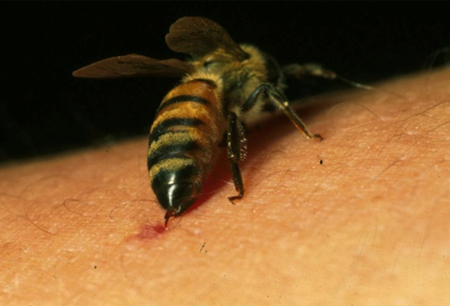Summary
Definition
History and exam
Key diagnostic factors
- witnessed bite/sting
- local edema
- local pain
- local warmth
- local markings
- pruritus
- wheal and flare
- skin pallor
- clamminess
- signs of airway compromise
- oropharyngeal edema
- dyspnea
- rales/crackles/wheeze
- tachycardia
- irregular pulse
- skin flushing
- altered alertness
Other diagnostic factors
- pustules
- bulls-eye-shaped rash
- rash on palms and soles
- linear raised rash
- hypertension
- fever
- muscle cramp
- diaphoresis
- tremor
- paresthesia and/or fasciculations
- generalized pain
- nausea/vomiting
- headache
- abdominal pain
- history of immunocompromised state
- history of cardiovascular disease
- abscess
- necrosis
- cough
- hypotension
- arthralgia
- adenopathy
Risk factors
- occupational or recreational exposure to insects
- geographic exposure to insects
- previous history of anaphylactic response
Diagnostic tests
1st tests to order
- clinical diagnosis
Tests to consider
- serum tryptase
- sensitivity testing
- CBC
Treatment algorithm
anaphylaxis
local reaction
secondary infection
Contributors
Authors
David B. K. Golden, MDCM
Associate Professor of Medicine
John Hopkins University
Baltimore
MD
Disclosures
DG has received consultant fees from Novartis, rAquestive, Kokua, and Celldex (all related to anaphylaxis); clinical trial support from Genentech, GSK, Merck, Lilly, Teva, Sanofi, Regeneron, Novartis, AstraZeneca, and Pfizer (all related to nonanaphylaxis disease states); and royalties from UpToDate (related to insect allergy).
Karla E. Adams, MD
Associate Professor of Pediatrics
Uniformed Services University
Department of Medicine, Allergy and Immunology Division, Wilford Hall Ambulatory Surgical Center
San Antonio
TX
Disclosures
KA received an honorarium and paid travel expenses to present lectures at the Eastern Allergy Conference and the Louisiana Society of Allergy, Asthma and Immunology on the topic of insect allergy in 2024.
Acknowledgements
David B.K. Golden and Karla E. Adams would like to gratefully acknowledge Tom Morrissey, a previous contributor to this topic.
Disclosures
Not disclosed.
Peer reviewers
Theodore M. Freeman, MD
Allergist and Immunologist
Jacobs Ramirez and Freeman Allergy & Immunology
San Antonio
TX
Disclosures
TMF is an author of a number of references cited in this topic.
Andrew Parfitt, MBBS, FFAEM
Clinical Director
Acute Medicine
Associate Medical Director
Consultant Emergency Medicine
Guy's and St Thomas' NHS Foundation Trust
Clinical Lead and Consultant
Accident Emergency Medicine
St Thomas' Hospital
London
UK
Disclosures
AP declares that he has no competing interests.
Richard DeShazo, MD
Chairman and Professor
Department of Medicine
Professor of Pediatrics
Billy S. Guyton Distinguished Professor
University of Mississippi Medical Center
Jackson
MS
Disclosures
RD is an author of a reference cited in this topic.
Peer reviewer acknowledgements
BMJ Best Practice topics are updated on a rolling basis in line with developments in evidence and guidance. The peer reviewers listed here have reviewed the content at least once during the history of the topic.
Disclosures
Peer reviewer affiliations and disclosures pertain to the time of the review.
References
Key articles
Shaker MS, Wallace DV, Golden DBK, et al. Anaphylaxis - a 2020 practice parameter update, systematic review, and Grading of Recommendations, Assessment, Development and Evaluation (GRADE) analysis. J Allergy Clin Immunol. 2020 Apr;145(4):1082-123.Full text Abstract
Golden DBK, Wang J, Waserman S, et al. Anaphylaxis: a 2023 practice parameter update. Ann Allergy Asthma Immunol. 2024 Feb;132(2):124-76.Full text Abstract
Golden DB, Demain J, Freeman T, et al. Stinging insect hypersensitivity: a practice parameter update 2016. Ann Allergy Asthma Immunol. 2017 Jan;118(1):28-54. Abstract
Sturm GJ, Varga EM, Roberts G, et al. EAACI guidelines on allergen immunotherapy: Hymenoptera venom allergy. Allergy. 2018 Apr;73(4):744-64.Full text Abstract
Biló BM, Rueff F, Mosbech H, et al. Diagnosis of Hymenoptera venom allergy. Allergy. 2005 Nov;60(11):1339-49.Full text Abstract
Reference articles
A full list of sources referenced in this topic is available to users with access to all of BMJ Best Practice.

Differentials
- Cellulitis
- Periorbital and orbital cellulitis
- Abscess
More DifferentialsGuidelines
- 2024 American Heart Association and American Red Cross guidelines for first aid
- Anaphylaxis: a practice parameter update 2023
More GuidelinesPatient information
Insect bites and stings
More Patient informationLog in or subscribe to access all of BMJ Best Practice
Use of this content is subject to our disclaimer
